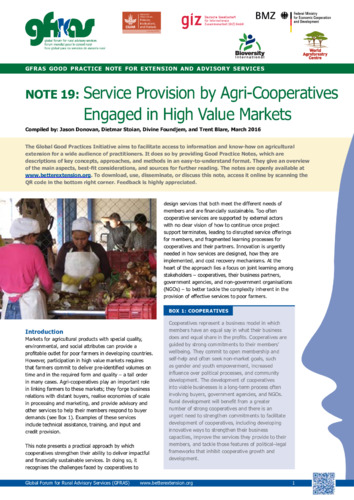Service provision by agri-cooperatives engaged in high value markets
Markets for agricultural products with special quality,
environmental, and social attributes can provide a
profitable outlet for poor farmers in developing countries.
However, participation in high value markets requires
that farmers commit to deliver pre-identified volumes on
time and in the required form and quality – a tall order
in many cases. Agri-cooperatives play an important role
in linking farmers to these markets; they forge business
relations with distant buyers, realise economies of scale
in processing and marketing, and provide advisory and
other services to help their members respond to buyer
demands. Examples of these services include technical assistance, training, and input and credit provision.
This note presents a practical approach by which
cooperatives strengthen their ability to deliver impactful
and financially sustainable services. In doing so, it
recognises the challenges faced by cooperatives to design services that both meet the different needs of
members and are financially sustainable. Too often
cooperative services are supported by external actors
with no clear vision of how to continue once project
support terminates, leading to disrupted service offerings
for members, and fragmented learning processes for
cooperatives and their partners. Innovation is urgently
needed in how services are designed, how they are
implemented, and cost recovery mechanisms. At the
heart of the approach lies a focus on joint learning among
stakeholders – cooperatives, their business partners,
government agencies, and non-government organisations
(NGOs) – to better tackle the complexity inherent in the
provision of effective services to poor farmers.

